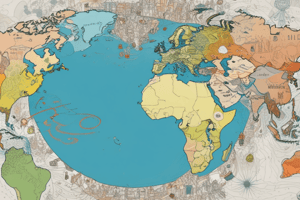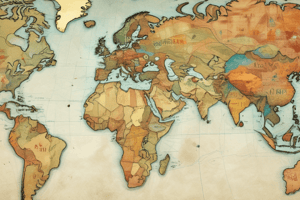Podcast
Questions and Answers
What was the core principle Napoleon Bonaparte sought to spread throughout Europe?
What was the core principle Napoleon Bonaparte sought to spread throughout Europe?
- Monarchical sovereignty
- Religious supremacy
- Nationalistic fervor
- Liberty, equality, and fraternity (correct)
Which battle marked the end of the Napoleonic Wars?
Which battle marked the end of the Napoleonic Wars?
- Battle of Waterloo (correct)
- Battle of Trafalgar
- Battle of Leipzig
- Battle of Austerlitz
What characterizes the Metternich System within the Concert of Europe?
What characterizes the Metternich System within the Concert of Europe?
- Advocacy for complete democratic governance
- Support for non-interventionist foreign policies
- Restoration of monarchial and religious privileges (correct)
- Promotion of socialist policies
Which philosopher is recognized as the first major proponent of liberal internationalism?
Which philosopher is recognized as the first major proponent of liberal internationalism?
What did Jeremy Bentham advocate for in terms of international relations?
What did Jeremy Bentham advocate for in terms of international relations?
What was Giuseppe Mazzini's stance toward the Metternich System?
What was Giuseppe Mazzini's stance toward the Metternich System?
Which of the following best describes Woodrow Wilson's influence in the 20th century?
Which of the following best describes Woodrow Wilson's influence in the 20th century?
What are the two categories of internationalism mentioned?
What are the two categories of internationalism mentioned?
Which attribute is NOT part of a state as defined in the content?
Which attribute is NOT part of a state as defined in the content?
What is the principle of self-determination?
What is the principle of self-determination?
What does the term 'nation' refer to according to Benedict Anderson?
What does the term 'nation' refer to according to Benedict Anderson?
What distinguishes Karl Marx's view on nationalism?
What distinguishes Karl Marx's view on nationalism?
What was the primary purpose of the Treaty of Westphalia?
What was the primary purpose of the Treaty of Westphalia?
Which of the following best differentiates internationalism from globalism?
Which of the following best differentiates internationalism from globalism?
What were some achievements of the Socialist International established in 1889?
What were some achievements of the Socialist International established in 1889?
Who was Vlademir Lenin?
Who was Vlademir Lenin?
What does the concept of globalization primarily influence in a government context?
What does the concept of globalization primarily influence in a government context?
What was the role of the Communist International (Cominterm)?
What was the role of the Communist International (Cominterm)?
Which statement correctly describes diplomacy in the context of global politics?
Which statement correctly describes diplomacy in the context of global politics?
What was Joseph Stalin's action regarding the Cominterm after WWII?
What was Joseph Stalin's action regarding the Cominterm after WWII?
How do international organizations (IOs) function in the contemporary world system?
How do international organizations (IOs) function in the contemporary world system?
What is a common consequence of internationalization between states?
What is a common consequence of internationalization between states?
What is the significance of the quote 'The measure of a man is what he does with power' by Plato?
What is the significance of the quote 'The measure of a man is what he does with power' by Plato?
What internal conflict does the idea of internationalism often present?
What internal conflict does the idea of internationalism often present?
Study Notes
Introduction To International Relations and Globalization
- The contemporary world is made up of many states, each with its own government.
- International relations is the study of relations between two states.
- Internationalization is the deepening of interactions between states.
Attributes of the Global System
- Sovereignty: This is the ability of a state to govern itself without interference from other states.
- Diplomacy: This is the practice of conducting negotiations between states.
- International Organizations: These are organizations that work to promote cooperation between states.
- IO's Take On Lives of Their Own: International organisations can gain considerable influence, often becoming more powerful than individual states.
The Nation-State
- A State refers to the countries and their governments.
- A state has four attributes and is recognized by other states: Sovereignty, citizens, territory and government.
- A Nation is a cultural and linguistic group.
- A nation may or may not have a state.
Treaty of Westphalia
- The Treaty of Westphalia, signed in 1648, ended the Thirty Years War between the major powers of Europe.
- It recognized the sovereignty of states and encouraged non-interference in the domestic affairs of other states.
Napoleonic Wars
- Napoleon Bonaparte challenged the Westphalian system.
- He believed in exporting the principles of the French Revolution - liberty, equality and fraternity.
- The Napoleonic Wars lasted from 1803-1815 and implemented the Napoleonic Code. This code promoted meritocracy, encouraged freedom of religion, and abolished birth privileges in government service.
Concert of Europe
- Napoleon was finally defeated by Anglo and Prussian armies at the Battle of Waterloo in 1815.
- The Concert of Europe was an alliance of great powers (Great Britain, Austria, and Prussia).
- This alliance enforced the principles of the Metternich System, which restored the power of monarchs, hereditary privileges, and religion.
- The Concert dominated international relations from 1815 to 1914, at the dawn of World War I.
Internationalism
- Internationalism is a movement that advocates for greater cooperation and unity between states and peoples.
- There are two main types of Internationalism:
- Liberal Internationalism: This emphasizes cooperation between states based on shared interests and values.
- Socialist Internationalism: This advocates for international cooperation between socialist states and the overthrow of the capitalist system.
Key Figures in Internationalism
- Immanuel Kant: A German philosopher who, in the 18th century, was the first major thinker of liberal internationalism.
- Jeremy Bentham: A British philosopher who coined the term “international” in 1780. He advocated for international law to govern interstate relations.
- Giuseppe Mazzini: An Italian patriot active in the 19th century who reconciled nationalism with liberal internationalism. He believed that unified, free nation-states should be the basis of global cooperation.
- Woodrow Wilson: 20th century US President who promoted the principle of self-determination - the right of nations to have a free and sovereign government.
- Karl Marx: A German socialist who believed that any true form of internationalism should reject nationalism. He saw "classes in society" as inherently opposed - Capitalist vs. Proletariat.
- Friedrich Engels: A German socialist who supported Marx in a socialist revolution to overthrow the state and alter the economy.
Socialist International Movements
- Socialist International (1889): A union of European socialist and labor parties that was established in Paris. It promoted international cooperation and achieved several successes, including May 1st as Labor Day, the 8-hour workday, and International Women’s Day.
Communist International Movements
- Communist International (Comintern) (1919): Served as a central body for directing Communist parties around the world.
- Communist Information Bureau (Cominform) (1947): Re-established by Joseph Stalin after WWII, after initially dissolving the Comintern in 1943 to appease Allied forces.
Globalization and the Effects on Governments
- Globalization has impacted how governments function and interact with other states.
- Globalization has also challenged the sovereignty of states.
- The rise of international organizations has given them significant power, sometimes exceeding the authority of individual states.
- The spread of internationalism has led to more cooperation and unity between states, but also challenges national identity and state sovereignty.
- Revolutions play a crucial role in promoting internationalism, especially in challenging prevailing political and economic systems.
Studying That Suits You
Use AI to generate personalized quizzes and flashcards to suit your learning preferences.
Related Documents
Description
This quiz covers key concepts in international relations and globalization, including state sovereignty, diplomacy, and the role of international organizations. Explore how these elements interact in the global system and their impact on the nation-state. Test your understanding of these fundamental theories and principles.




